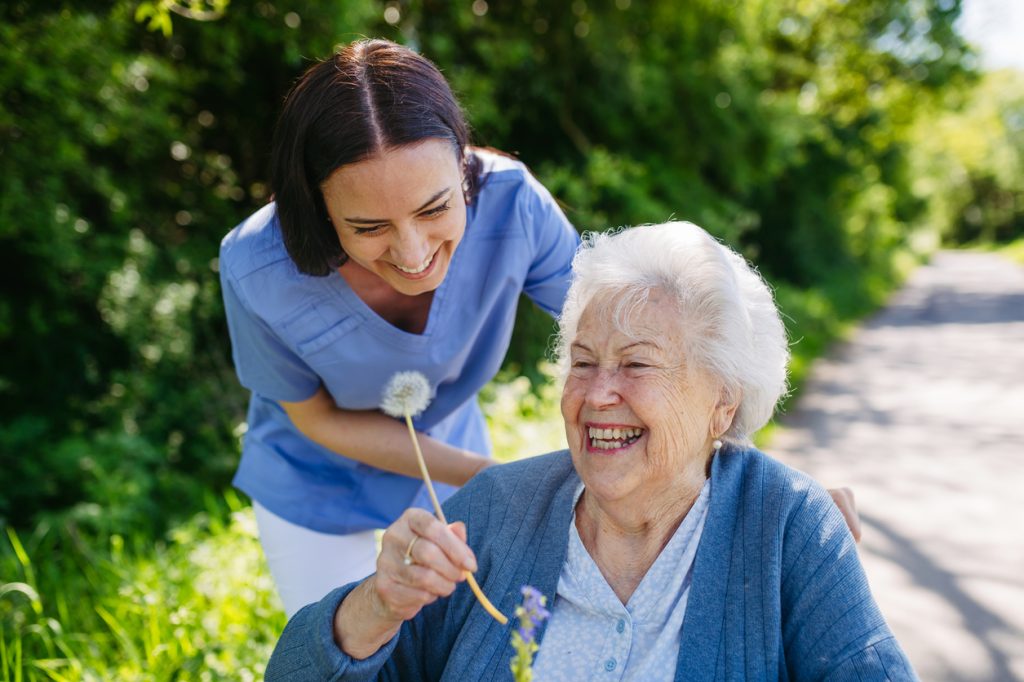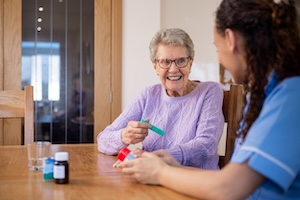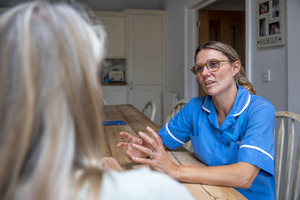If you’ve been providing care for a family member or friend for a while now, you may be thinking about officially becoming a registered carer. In this guide, we’ll cover what it means to become a registered carer, how to do it, and other support you may be entitled to.
Contents:
- What does it mean to become a registered carer?
- Registering with your GP
- Registering for Carer’s Allowance
- Registering as a self-employed carer
– What qualifications do you need?
– How to set up your business
– What insurance do you need as a self-employed carer? - Managing stress as a registered carer
- How to register as a carer for a parent
- Becoming a full-time carer for a family member
- Key takeaways
- Frequently asked questions
What Does It Mean to Become a Registered Carer?
A registered carer can receive access to support from your local GP, as well as register for any benefits you may be eligible for as a result of the hours you spend caring for someone. You might be a self-employed carer, or an unpaid carer for a friend or family member.
You can register as a carer with your GP, and this will then be recorded on your notes. Being registered as a carer means you will be asked about your physical/mental well-being, offered more flexibility when it comes to arranging medical appointments, and notified of any support services you may find helpful.
There are a number of reasons why becoming a registered carer could be a good move for you, including:
- If you are currently an unpaid carer but need financial support to carry on
- You think you may be eligible for carer’s benefits
- You work as a carer at an agency but would like to become a self-employed carer at some point in the future
- You are interested in starting a carer agency of your own
If you want to become a registered carer, consider the following steps to make this happen:

Register With Your GP
If you are an unpaid carer, there are many benefits to registering as a carer with your GP practice. This applies even if you are in receipt of Carers Allowance.
Benefits of registering as a carer with your doctor include:
- Making staff aware of your role as a carer
- Providing more convenient appointment times
- Access to designated a ‘Carers Champion’ that many GP practices have
- Access to useful information and support as a carer
- You will receive free annual health checks and flu vaccinations
Register for Carers Allowance
Becoming a registered carer can give you additional support and flexibility in your role as a carer, but did you know that you may also be entitled to financial support? Carer’s Allowance is a benefit available to unpaid carers.
You may be eligible for Carer’s Allowance if you:
- Care for someone at least 35 hours/week
- Are aged 16 or over
- Are no longer in full-time education or studying for more than 21 hours/week
- Earn less than £151/week after taxes, care costs, and 50% of what you pay into your pension.
We’ve written a total guide to carers allowance and your benefits, so have a read of it and see what you need to do in order to register for carers allowance.
Becoming a Self-Employed Carer:
If you are working as a carer rather than providing care unpaid, you may want to register as a self-employed carer to develop your business. You will need to meet a few more requirements. These include:
1. Qualifications
While there is no legal requirement to have certain qualifications as a carer, you may still want to get certain certifications as a self-employed carer to show your clients that you can provide the proper care they need.
There are many diplomas and NVQs you can take, or you might choose to focus on gaining more direct experience as a carer before moving into a self-employed caring role.
2. Set Up Your Business
To become a registered self-employed carer, you will need to think about the business side of things as well as your day-to-day work. This includes:
- Registering as a self-employed with HMRC
- Completing your Self-Assessment tax return
- Creat a business plan to think about how many clients you would like to take on, income, expenses etc
3. Insurance
When you are a self-employed carer, it is a good idea to consider what you will do if something goes wrong while working – whether that’s incurring an injury yourself or the person you care for getting hurt.
Having an insurance policy to protect you in these circumstances is important, covering you for things such as:
- Public liability i.e. protecting you if someone is injured because of your business
- Employers’ liability insurance (if you employ staff)
- Accidental loss or damage to your personal belongings
- Personal accident
Take a quick look at our self-employed carers insurance page to make sure you and your business have the protection you need.
Managing Stress as a Registered Carer
Deciding that you are going to start a home care business is exciting and empowering, but as with any role that comes with responsibility, there will be moments where things can feel stressful. Taking a moment to consider these three top tips on managing your stress can really help:
- Try to make 20 minutes for yourself every day where you can do something relaxing like sit and read or practise breathing exercises.
- Connect with other registered carers in your local area and ask them about their own experiences, processes, and outlook on their role
- Create a simple-to-follow budget that will show you how to use any benefits and allowances you receive
Making time for yourself to reduce and manage your stress levels is never something that you should feel guilty about — it’s what will allow you to give your all to your new role. In many cases, this can mean working every day with a relative or loved one to make sure they enjoy the quality of life they deserve.

How to Register as a Carer For a Parent
Deciding that you are going to care for your parent is something that many of us may face in life. To simplify what is a deeply emotional decision, here are the key things you need to consider:
- Ask your GP to add you to their Carers Register
- Contact your local council regarding a Carer’s Assessment
- Visit gov.uk to check your Carer’s Allowance eligibility
- Contact Citizens Advice for guidance on benefits and support
You may also find the next section helpful when making your decision.
Becoming a Full-Time Carer For a Family Member
Deciding whether or not you are ready to become a full-time carer for a family member may be a complex process. Here are the key things to consider:
- Family Communication: Discuss your intention with the family member you will be caring for and other relatives to hear their points of view
- Your Loved One’s Condition: Consider any complex needs your relative may have and how this may affect any training you need to undertake
- Respite Care: Think about how you can guarantee yourself regular breaks from your role so that you can look after yourself and maintain your energy levels
- Your Previous Career: If you would like to return to your previous job in the future, thinking about hybrid roles and part-time positions may help you maintain perspective and put a plan in place
Taking your time to work through each of these considerations will give you the time and space you need to make a decision that works for everyone involved.
Key Takeaways
- Our guide on becoming a self-employed carer will show you how to build your new business on the right foundation
- Having specialist insurance in place will protect you in the event of an accident, injury, or issues with a third-party
- Unpaid carers who become registered carers may be able to benefit from a number of sources of financial support
FAQs
Yes, in the UK, you can register another family member as a carer if they provide substantial care and support for someone with a long-term illness, disability, or age-related condition.
The family member can be registered with your local council, GP, or carer support organisations to access services like respite care, financial support, and emotional assistance. It’s important to ensure the person providing care is aware of their rights and entitlements, such as the Carer’s Allowance or other benefits that might be available.
Yes, if you are a registered carer or provide significant care for someone, you can register with your energy provider for additional support.
UK energy companies offer a Priority Services Register (PSR), which is designed to provide vulnerable customers, including carers, with additional services. These services may include advance notice of planned power cuts, priority reconnection during outages, and assistance with managing energy bills. Contact your energy provider to get added to the PSR and ensure that both you and the person you care for receive the necessary support.







